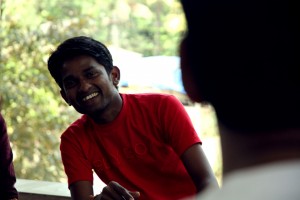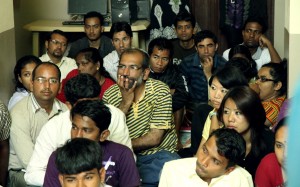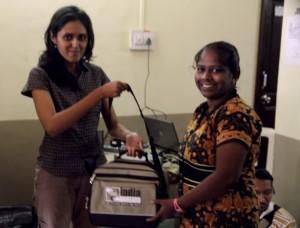It is the last day of the training, and everyone is given an opportunity to share what they learned from the training. The Community Correspondents (CCs) now all have excellent journalistic skills, they are able to report unheard stories and to handle videos. For many, what they have learned goes far beyond that, and has changed their views on their lives and communities.
Margaret starts the session. Margaret is perhaps the most experienced and fearless activist in the group. She is a local activist with People's Watch, leading Tamil human rights organization, bringing justice to victims of domestic violence, caste atrocities and corruption through extremely contentious dealings with government officials and police. Being a human rights activist, she already knew what are the laws, who are the responsible people and how to take action. But in this training, she learned a powerful new tool -- video - to help her in that work. She feels confident making five videos a month. Videos can be integrated into her human rights activism, helping to bring concrete change and starting judicial action. She said the newest thing she learned was to make personal connections to her work. In all other trainings on human rights advocacy, people are expected to be distanced, to only talk about the work and never talk about themselves. Here, she reflected deeply on how she was personally connected to the stories she tells and this made her a stronger activist..
It is now Anand’s turn. Anand has already met Stalin before the training. He remembers that they agree on an essential principle: what matters is not how much a film costs, but how many people you have reached thanks to this film. After their first meeting, Anand had joined Abhivyekti, where he was a media trainer. But he underlines that this training is original. Whereas media trainings are usually restricted to technical matters, people here have been encouraged to think of their own identities and to draw personal connections. Human rights and personal experiences were at the core of these two weeks. “It is the first training where it is allowed to cry.” Anand is confident making 6 to 7 videos a month. He is very committed to the India Unheard project, as he even accepted to relocate to Malegaon, to report this city's unheard stories.
Sandhya goes on. She feels she learned a new short and sweet format, that is great for news and communicating information. She also wants to thank Stalin for being here from morning to dark. She has worked in a community video unit for two years, but this training was still a big change to her. She is glad to have experienced so much, being only 18.
 Amol steps in. Stalin recalled the first time he met Amol – almost five years ago, when Stalin selected him from a group of 20 applicants to be a community producer at the new CVU Video Volunteers was starting with Akshara. Stalin asked, “what do you do? I’m a rickshaw driver. What do you want to do? I want to be a great camera”, Stalin recalled the smile that spread over his face. “Amol,” Stalin asked, “you now are working in TV, as an assistant camera man on lots of serious across Bombay. You are living your dream, are you not?” Amol considered this and looked very happy. But then he said, “somehow, even though I can work in the mainstream, it doesn’t make me so happy. This is where my heart is. Making my own films, expressing myself, and working on issues.” This is the journey of a young man from a terribly disadvantaged background – his basti in bombay is just now about to be demolished – whose primary concern is money, and a career in the glitz of Bollywood, who actually gets it, but then discovers he wants to work for people. Someone from Deutsche Welle TV is going to be making a documentary about him, and as we see his massive ear to ear smile, his hugely expressive face, the gusto with which he shadows stalin to learn the drums and whatever else he can from him, we can see why.
Amol steps in. Stalin recalled the first time he met Amol – almost five years ago, when Stalin selected him from a group of 20 applicants to be a community producer at the new CVU Video Volunteers was starting with Akshara. Stalin asked, “what do you do? I’m a rickshaw driver. What do you want to do? I want to be a great camera”, Stalin recalled the smile that spread over his face. “Amol,” Stalin asked, “you now are working in TV, as an assistant camera man on lots of serious across Bombay. You are living your dream, are you not?” Amol considered this and looked very happy. But then he said, “somehow, even though I can work in the mainstream, it doesn’t make me so happy. This is where my heart is. Making my own films, expressing myself, and working on issues.” This is the journey of a young man from a terribly disadvantaged background – his basti in bombay is just now about to be demolished – whose primary concern is money, and a career in the glitz of Bollywood, who actually gets it, but then discovers he wants to work for people. Someone from Deutsche Welle TV is going to be making a documentary about him, and as we see his massive ear to ear smile, his hugely expressive face, the gusto with which he shadows stalin to learn the drums and whatever else he can from him, we can see why.
Then, two women, who shall remain nameless in this blog, shared awful experiences of sexual violence and in one case, near ostracization from her family. “My father slapped me when I told him what had happened, told me it was my fault. I was raped at age seven. I hate him to this day. And when I heard the other girl open up here today, I wanted to slap her, because I’ve always thought that if I kept quiet, the pain would go away. But it doesn’t work.”
For both girls, this was the first time they were sharing these experiences. Their tremendous courage in sharing these experiences awed everyone, and gave a living example of the healing power of speaking out, an experience our community correspondents give to the people they interview. It also provided a living example of why we talk about making a personal connection in their videos – it is because when you yourself share something, you inspire others to go deeper and share parts of themselves too. Stalin, after hearing these girls speak, was overcome with emotion himself and shared experiences of the Gujarat riots. His mother was in the room, and he too said, “I have never shared these stories in front of my mother before.” Though it is impossible to know what others feel, there was likely a tremendous sense of the horrors people inflict on each other in this world – and of the courage in overcoming it.
A unique workshop
One of the unique things in this workshop was how many people had experienced violence, since we had people from Kashmir, the Northeast, victims of domestic abuse, a very courageous human rights activist who has seen horrors, someone who experienced the Gujarat riots, people who had had close loved ones murdered in crimes linked to corruption and gender,  and – as the girls’ sharing on the last day suggested – people who didn’t share their stories but had experienced whatever private pain they had that made them want to be part of this work.
and – as the girls’ sharing on the last day suggested – people who didn’t share their stories but had experienced whatever private pain they had that made them want to be part of this work.
In comparison with previous training camps, this workshop was unique by the strength of its community correspondents' experiences. The personal connections, that constitutes the core of community videos, were numerous and powerful. During this workshop, the CCs learned to explore their lives and experiences, and to reflect on what they went through, in order to turn it into material for stories. They are now able to distinguish the injustice around them, and to mobilize their feelings of anger and despair to make powerful videos.
The Video Volunteers (VV) staff also benefited a lot from this training. Spending time with the CCs was a very strong experience, which makes meaningful the work accomplished all year round for the IndiaUnheard project. The whole VV staff has worked hard to make up this training camp, and witnessing that the CCs get so much out of it is a great reward. Manish says that he hopes to make future trainings even better. Tara tells the group how working for VV is rewarding in comparison with what she used to do. She feels she has grown more in this job than in others, because she get to talk to people and share with them. Kamini says that she is aware of having had a privileged life, and that this week gave her the courage and willingness to work to ensure others have the same life.
Fighting for Change: The Story of Bihar-Based Journalist Amir Abbas
Inspiration can come from many sources, but one of the most powerful is seeing someone walk the path before you. Our Community Correspondent, Syed Amir Abbas found his inspiration in Stalin K., the founding director of Video Volunteers. “I met Stalin at VV’s national meet in 2017 and I...
Video Volunteers Receives Encouraging Response To Its Buland Bol Program
Free media training course Buland Bol aims to train hundreds of people in becoming the voice of their communities.

